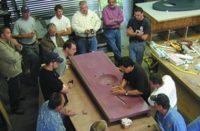
Unless you can handle every decorative concrete job yourself, a skilled, reliable crew is one of the keys to staying in business.
Concrete Decor talked to several business owners and got some great advice about effective ways to train and keep a crew.
There’s a high level of artistry in decorative concrete work, and many different techniques in play. Sometimes, it’s worth training your crew members yourself. That’s the approach taken by Tom Ralston, president of Tom Ralston Concrete in Santa Cruz, Calif.
Most of Ralston’s workers receive extensive on-the-job training. “I’ve trained most of them myself,” he says, “and I’ve taught them what I know about making our work better and easier.”
Gregory Mata, president of Cutting Edge Decorative Concrete in Richfield, Ohio, relies on on-the-job training as well as written instruction manuals. “Usually, we pair up a new guy with someone who has more experience,” he says. “Unfamiliar tools, equipment or techniques are explained repeatedly.”
Quality-control meetings can also be educational, as long as these sessions don’t simply focus on “what-went-wrong,” but also help the crew better understand the various factors involved in successful jobs.
Steve Schmid, owner of Stone Touch Inc., Salt Lake City, believes trade shows such as World of Concrete can be excellent opportunities to learn about new products and techniques.
“We also keep an ear out for seminars run by individual manufacturers,” Schmid says. When possible, he sends crew leaders to the sessions who pass new knowledge to other workers when they return home.
Mata agrees with Schmid. “That stimulation creates new ideas for your business. It is definitely some of the stuff that keeps a contractor on top.”
In-house training programs for the inside staff — such as programs on design and bidding techniques — can also pay off.
All that education adds up to a major investment of time and money, whether it’s in one employee or 30. So to take things to the next logical step, there’s plenty you can do, our experts say, to keep your human assets happy and productive.
Kelly Dickinson, owner of Superior Concrete & Masonry Construction, Riverside, Calif., offers these simple tips. “Help your employees believe in you and in the company. Give them a reason to take pride in the company they represent.” And make sure they have fun, he says, whether the company hosts a cookout, provides tickets to a ball game, or sponsors some other activity.
“Treat your workers with the utmost respect,” says Ralston. Their work is dirty and stressful, and your ongoing support of their efforts is essential. If needed, don’t hesitate to pitch in yourself on a project.
Ralston is a firm believer in financial rewards for extraordinary work. Just last year, he says, he distributed a substantial amount of bonus money among his employees. “It gets costly,” he says, “but it’s worth it.”
You might consider helping them further their education, and not just in professional areas. “If they want to improve themselves, I’m all for it,” Schmid says. And he proves it by underwriting — and sometimes providing transportation for — English classes (taught by local schools and church groups) for his Spanish-speaking employees. He even picks up part of the tuition costs for night school in any subject his crew members want to study.
Barry Fisher, owner of Unique Concrete, West Milford, N.J., says offering flextime can be beneficial, as long as the policy is not abused. “You must recognize that they have a private life, and can’t always take care of personal business during their off-hours,” he says.
Dickinson notes that a company’s owner often needs to act as a cheerleader and coach, to keep morale high. He also suggests that owners focus on keeping the crew consistently busy. “It’s tough to manage, but it’s achievable,” he says. “When the guys put in extra effort, the company will thrive.”
Thriving can be a difficult task in today’s economy, but our experts offer succinct advice. “Take jobs for less money, to keep your guys busy. But don’t settle for peanuts or work at a loss,” Ralston says.
Greg Mata offers: “If you operate as a professional in everything you do, you’ll never fail, you’ll never be out of work, and you’ll always make money.”
“Minimize your overhead and personal expenses even if it means making unwanted sacrifices. Strengthen your workforce and hold everyone accountable for their results and actions,” says Dickinson.
Barry Fisher’s tip? “Use your imagination to expand your products and applications. Find a niche, and do what others are not.”















